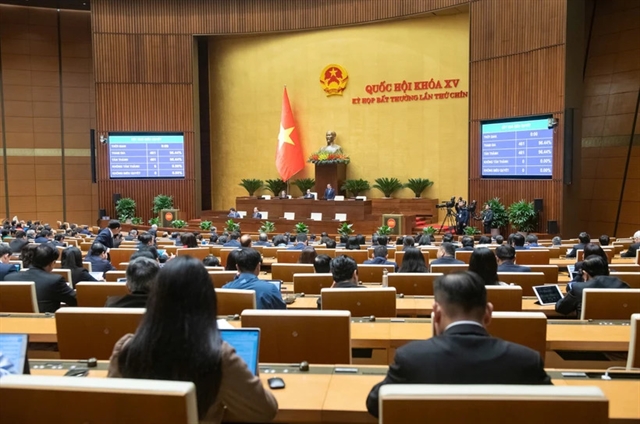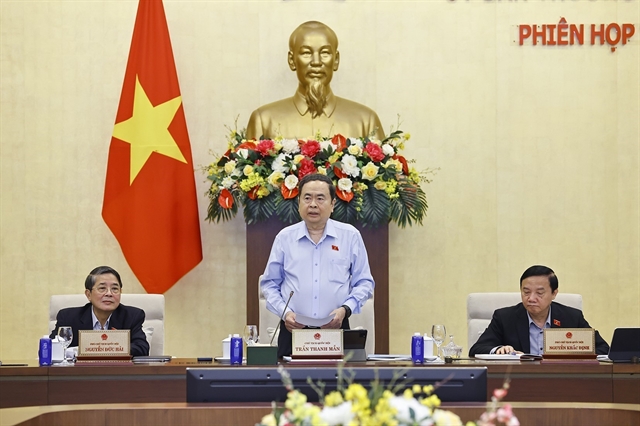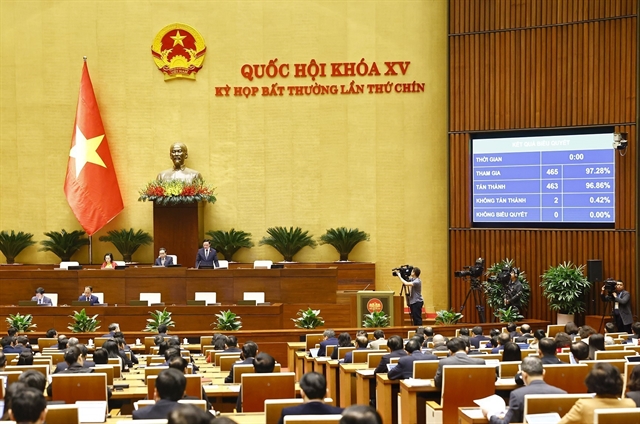 Politics & Law
Politics & Law

 |
| National Assembly deputies vote to adopt the amended Law on the Organisation of the Government on Tuesday. — VNA/VNS Photo Doãn Tấn |
HÀ NỘI — The National Assembly (NA) on Tuesday approved the amended Law on the Organisation of the Government at its ninth extraordinary session.
The revision received 96.86 per cent approval, with 463 out of 465 participating NA deputies voting in favour.
The revised law, consisting of five chapters and 32 articles, will take effect from March 1 this year.
The adoption follows discussions held on February 13 and 14, which focused on ensuring the consistency of the law within Việt Nam’s broader legal framework.
Legislators emphasised the need to carefully review provisions on power delegation and decentralisation to maintain alignment with the Constitution and other existing laws.
They also stressed that decentralisation must be coupled with power control mechanisms to prevent abuse of authority.
Responding to these concerns, the NA Standing Committee conducted a review to guarantee the law’s constitutional compliance and coherence with related legislation.
According to the revised Law on Organisation, the Government oversees the management of state affairs across sectors and assigns the ministries and ministerial-level departments to their respective management scopes.
The Government must also ensure clear roles and responsibilities between ministers and ministerial-level leaders.
It is also responsible for deciding policies on sectoral, regional and local development, except for areas under the jurisdiction of the NA and local authorities.
These policies must be aligned with the Party’s guidelines and the country’s socio-economic development plans and strategies for each period, as well as the growth targets, missions and policies approved by the NA.
For scopes of work that have been delegated to local authorities, local management will take the initiative to make decisions, lead the implementation process and be responsible for the results.
Provisions on control and decentralised responsibilities are stated in the amendment, detailing the specific duties of the Government, Prime Minister, ministers and heads of the ministerial-level agencies.
The revision also clarifies the concepts of power delegation, decentralisation and authorisation in response to NA deputies’ comments, outlining the scope, subjects, responsibilities, principles, conditions and circumstances under which transfers of authority may occur.
Regarding power decentralisation, the drafting committee ensured consistency by clearly defining delegating and receiving entities and their respective responsibilities, along with implementation procedures.
The law establishes fundamental principles while allowing specialised legal documents to determine specific matters that cannot be decentralised.
In regard to authorisation, this revision was designed to align with regulations in the draft Law on Organisation of Local Administration (revised), detailing the methods, content, scope, time limits for authorisation and fundamental principles for implementation.
On the same day, the NA also discussed the Government’s organisational structure and number of members, as well as organisational and personnel matters related to the NA. — VNS




